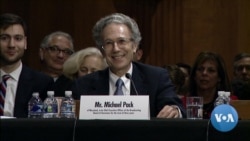The new overseer of Voice of America pledged Wednesday to uphold its mandated role of providing independent worldwide journalism even though it is a U.S. government-funded agency.
Michael Pack, sworn in recently as the chief executive of the U.S. Agency for Global Media which oversees VOA and other U.S. international media operations, told VOA’s broadcasters, editors, writers and other staff members in an email that he is “fully committed to honoring VOA’s charter ... and the independence of our heroic journalists around the world.”
Pack was nominated by President Donald Trump to lead USAGM more than two years ago. But with solid Democratic opposition to his appointment, the Republican-controlled Senate voted only two weeks ago to approve a three-year term for Pack to head USAGM.
In recent weeks, Trump has criticized VOA for its news coverage of China during the coronavirus crisis. When asked about the Pack nomination on May 15, Trump said, “Voice of America is run in a terrible manner. They’re not the Voice of America. They’re the opposite of the Voice of America.”
Pack made no mention of Trump or the controversy in his email to staff. Nor did he say whom he plans to name as VOA’s director.
Amanda Bennett, VOA’s director since 2016, and her top deputy, Sandy Sugawara, both veteran journalists, resigned on Monday, saying that the newly empowered Pack had a right to name his own VOA leadership.
Bennett was a staunch advocate for VOA’s independent journalism, rebuffing Trump’s recent criticism and defending the U.S.-funded news agency’s mission and reporting.
“We export the First Amendment to people around the world who have no other access to factual, truthful, believable information,” she said. The First Amendment to the U.S. Constitution guarantees the freedom of speech.
“That’s why more than 80% of our 280 million audience in 47 languages in more than 60 countries say they find our work credible,” Bennet said.
Some outside watchdogs have voiced fears about Pack’s tenure at USAGM, citing his record as a conservative filmmaker and associate of former Trump adviser Stephen Bannon and suggesting he might not withstand White House pressure for news coverage favorable to Trump.
The New York Times said in an editorial Tuesday, “The specter of turning V.O.A. into a propaganda tool of the White House should be frightening to all Americans, regardless of political leanings.” The editorial concluded, “Mr. Trump wants a bullhorn, not a diplomatic instrument, and he insists on loyalty.”
As Pack took over as chief executive, the directors of the Broadcasting Board of Governors -- which formerly controlled VOA and its sister networks -- published their own definition of independent journalism in the Federal Register of government actions.
“USAGM-funded networks each enjoy full editorial independence, as that term is defined and understood by best practices of journalism,” the statement said.
“Editorial independence includes, but is not limited to, the fact that only individuals within the network may make any decisions with respect to newsgathering or reporting,” the directors said. “USAGM networks and their employees, including the heads of each network, are fully insulated from any political or other external pressures or processes that would be inconsistent with the highest standards of professional journalism.”
Pack, in his mid-60s, has held previous executive positions at U.S. government international and public media agencies. But in recent years, he told USAGM employees, he has run a private venture, Manifold Productions, that has produced 15 documentaries that have aired in the U.S. on the Public Broadcasting Service.
“These films were also my way of telling America’s story,” he said. “Although making documentaries is very satisfying work, I was eager to return to international broadcasting at this critical juncture in our history."
He said, “America’s adversaries have stepped up their propaganda and disinformation efforts. They are aggressively promoting their very different visions of the world.”
Pack said he would seek to improve employee morale at USAGM and “examine some of the problems that have surfaced in the media in recent years.”
“Most importantly,” he wrote, “my mission will be to make the agency more effective.”






